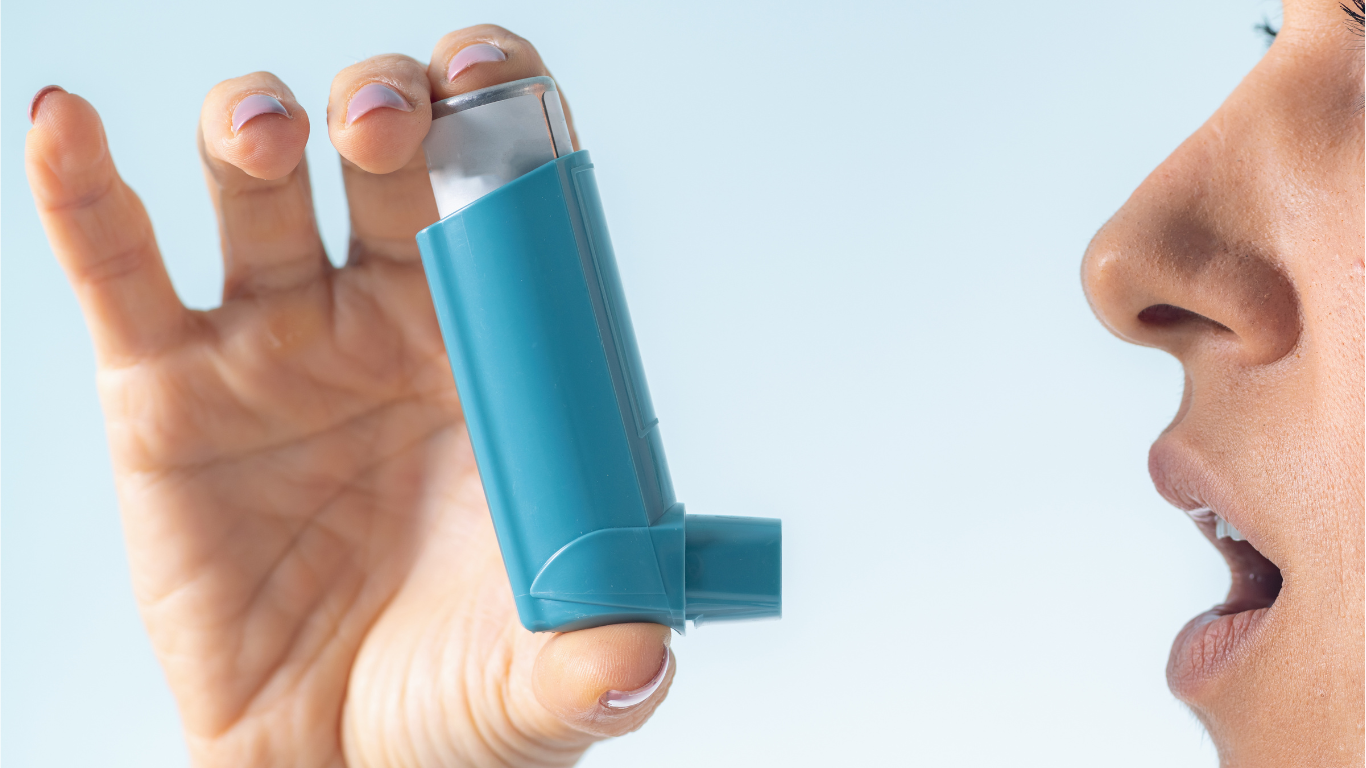Treat and Manage Asthma Attacks Singapore
by: Dr. Paul Chang, General Practitioner, Regis Medical
Last updated: November 29, 2025
Asthma refers to a condition in which the airways are inflamed. This makes them more sensitive than usual. Sensitive airways react strongly when exposed to certain triggers. They then narrow, causing breathing to become difficult.
Jump to
Asthma in Singapore
Asthma is one of the most common childhood conditions in Singapore, with 1 in 5 Singaporean children having asthma. It is estimated that about half of these children eventually outgrow their asthma while the remaining tend to have milder and less frequent attacks. Approximately 5 percent of these children continue to have asthma in adulthood. Despite this, a study in 2021 showed that the mortality rate of asthma in Singapore was almost 3 times higher than that of other developed nations such as the United States and New Zealand.
Consult a Doctor about your Asthma Symptoms at Regis Medical
Patient-first, Holistic, Dedicated Healthcare
What is Asthma?
Asthma is a disease that affects your lungs and airways, causing wheezing, breathlessness, chest tightness, and coughing at night or early in the morning. Asthma cannot be cured, only managed. The severity of asthma can range from mild to serious. Severe asthma can interfere with your daily life, even potentially causing a life-threatening asthma attack.
During an asthma attack, three things can happen:
- Bronchospasm. The muscles around your airways tighten, causing your airways to narrow. This can prevent air from moving through your airways into the lungs, causing you to be unable to breathe.
- Inflammation. Your airways become inflamed, with the lining of the airways swelling up. This can reduce the amount air flowing through the airways or even prevent air from flowing through the airways.
- Mucus production. Excessive mucus is produced, which can clog up your airways, stopping air flow.

Types of Asthma
There are several types of asthma and knowing the type of asthma you have can be helpful in finding ways to prevent asthma attacks or control your symptoms better.
Adult-onset Asthma
While asthma tends to be more common amongst children, it can suddenly develop during adulthood past the age of 18.
Pediatric Asthma
Sometimes referred to as childhood asthma, this type of asthma typically begins before the age of 5, in infants or toddlers. Asthma can be dangerous for children as they may not understand what is happening during an attack.
Exercise-Induced Asthma
Also known as Exercise-induced bronchoconstriction, this type of asthma causes asthma symptoms to show up as a result of physical activity.
Occupational Asthma
This type of asthma usually happens to people who work in occupations where they are constantly exposed to irritants that cause or worsen their asthma symptoms.
Asthma-COPD Overlap
Chronic obstructive pulmonary disease (COPD) refers to a collection of lung diseases that cause breathing problems and obstruct airflow. Some patients have both asthma and COPD, which can be serious and deadly. COPD is progressive, making it important for you to get it treated early if you show signs of it.
Asthma Symptoms
Asthma symptoms can differ from person to person. The severity of asthma attacks can also differ. Asthma symptoms include:
- Shortness of breath
- Wheezing when trying to breathe
- Coughing or wheezing, especially at night
- Chest tightness or pain
Possible Triggers of Asthma Attacks
Asthma attacks can be life-threatening, making it important for you to understand what triggers your asthma so that you can take the necessary actions to avoid asthma attacks.
Some common asthma triggers include:
- Allergies. If your asthma occurs frequently despite adequate follow up and treatment, you may want to visit an allergist to find out if you have any underlying allergies that have been triggering your asthma.
- Food. Food allergies can be a trigger for asthma. Asthma can also be part of a severe, life-threatening reaction called anaphylaxis.
- Exercise. For people with exercise-Induced asthma, heavy workouts can cause their airways to narrow, potentially resulting in an asthma attack. Conducting a proper warm-up and having a puff of salbutamol before exercising can be helpful in preventing this.
- Smoking. If you already have asthma, smoking can worsen your condition and symptoms.
- Medications. Some asthma patients may be sensitive to certain drugs and medications, such as aspirin or beta-blockers. These medications can trigger asthma attacks. It is best to check with your doctor if you think certain medications are causing you asthma attacks or worsening your asthma.
- Weather. There is an association of colder temperatures with asthma attacks.
Risk Factors of Asthma
Here are some of the risk factors of asthma:
- Family History of Asthma. If you have a parent who has asthma, you are statistically three to six times more likely to get asthma.
- Atopy. Atopy refers to the genetic tendency to develop allergic diseases such as allergic rhinitis, asthma and atopic dermatitis (eczema). Having atopy means that you are more likely to be highly sensitive to common allergens, especially those found in food or in the air. This may cause you to develop asthma.
- Cigarette Smoke. Studies have linked the development of asthma to smoking, especially in the case of smoking amongst adolescences.
- Obesity. Studies suggest that asthma is more common amongst overweight children and adults. Overweight asthma patients also tend to experience more severe asthma attacks.
- Environmental Factors. Environmental factors such as pollution, sulfur dioxide, nitrogen oxide, ozone, cold temperatures, and high humidity are all known to trigger asthma. Heavy air pollution and cold air have all been recorded to cause asthma attacks or symptoms.
Complications of Asthma
Asthma can lead to various complications, that can range from mild to serious.
Sleep Deprivation
People with asthma often experience symptoms such as wheezing and coughing, especially at night. Over time, this can interrupt your sleep schedule leading to sleep deprivation which can affect your daily performance.
Lack of Physical Activity
Asthma can prevent you from being able to participate in physical activities such as exercise or sports. A lack of physical activity can increase your risk factor of developing certain chronic illnesses such as diabetes or high blood pressure.
Airway Remodeling
Asthma can cause chronic inflammation of the airway, which can result in permanent changes in the structure of your airways. This includes any form of changes in structural cells and tissues within the airways. These alterations can cause:
- Loss of lung function
- Chronic coughing
- Thickening of the airway walls
- Increased production of mucus
- Increased blood supply in the airways
Respiratory Failure
Patients with severe asthma carry a higher risk of respiratory failure. Respiratory failure is life-threatening, occurring when insufficient oxygen travels from your lungs to your blood. This can happen when an asthma attack is so severe that the inflammation in the airways prevents you from breathing, requiring emergency medical treatment.
Flu
The common flu, while usually harmless, can cause complications in asthma patients. The flu can trigger asthma attacks or worsen asthma symptoms.
Diagnosing Asthma
If you experience asthma symptoms but have not been diagnosed with asthma, you may want to visit a doctor so that an accurate diagnosis can be made. To diagnose asthma, a doctor will need to understand your symptoms and look into your medical and family history. Afterwards, a physical examination and tests may be carried out to check if you have asthma. There is no specific one test to diagnose asthma and it is a clinical diagnosis. However the following tests may help provide the doctor with more information on your condition.
Breathing Test (Spirometry)
Spirometry is a common breathing test that is used to diagnose asthma or monitor lung function. The test measures the rate and volume of air flowing out of your lungs. These measurements will allow your doctor to check for problems with your lungs.
Peak Flow Meters
A peak flow meter measures the speed of air moving out from your lungs. These readings help to determine:
- Your asthma triggers
- Whether adjustments need to be made to your asthma action plan
- Whether you need emergency treatment
Allergy Test
An allergy test may be conducted to find out if your asthma is being triggered by certain allergens. This will also help you avoid these allergens so that you can prevent asthma symptoms from worsening or future asthma attacks. Common allergens include cat fur and house dust mites. Allergy tests come in many forms and are also not a diagnostic test for asthma. It is better to discuss with a trusted doctor regarding performing the correct allergy test for your condition.
Preventing Asthma attacks
While asthma cannot be prevented, it is possible to prevent asthma attacks. Asthma education is particularly important for asthma patients. Here are some ways in which you can do so:
Have an asthma action plan. Having a detailed plan for taking medications as well as managing an asthma attack can be key in monitoring and controlling the condition.
- Flu and pneumonia vaccinations. Asthma patients tend to react poorly to respiratory infections such as the flu and pneumonia. These infections can also trigger asthma attacks. Being vaccinated against these infections can help you avoid such situation.
- Identify and avoid asthma triggers. Working together with a doctor to find out your asthma triggers can help you avoid future asthma attacks. This can be done by conducting an allergy test.
- Identify and treat attacks early. If your asthma attack is treated quickly, it is less likely to become severe and symptoms can be curbed while they are still mild.
- Take note of your inhaler usage. If you find yourself having to use your inhaler more, your asthma condition might be out of control. Talk to a doctor so that your treatment plan can be adjusted accordingly. Another way to monitor your symptoms would be to take a self-administered Asthma Control Test (ACT).
Asthma Attack Treatments
Besides avoiding your asthma triggers, you may be prescribed long-term medications in order to keep your asthma under control. Asthma attacks may sometimes be unavoidable and quick-relief medicines can be used. Asthma treatment and medication generally aims to reduce airway inflammation or to relax the muscles around the airways.
Quick-Relief Medication
Quick-relief medication is used to treat sudden asthma symptoms, usually taken through an inhaler.
Short Acting Beta-2 Agonists (SABAs)
SABAs are quick acting medicines that help to relieve sudden asthma symptoms. It relaxes the muscles around the airways, removing constriction and allowing you to breathe better. However, you should keep track of how often you have to use your quick-relief medicine as increased usage may suggest that your asthma condition is worsening.
Long-term Control Medicines
Long-term asthma medication aims to prevent asthma symptoms rather than to treat them like quick-relief medication.
Anti-inflammatories
Anti-inflammatories or inhaled corticosteroids treat airway inflammation caused by asthma. This form of medication is meant to be taken daily as prescribed, regardless of whether you have symptoms.
Leukotriene Receptor Antagonists
Leukotriene receptor antagonists block the action of leukotrienes, which can increase inflammation in the airways of your lungs.
Immunomodulators (Immunoglobulin E (IgE) inhibitors)
LgE inhibitors are effective in treating asthma that is triggered by allergies and cannot be controlled by other medications. These come in the form of an injection, usually given once or twice a month to patients who have moderate to severe persistent allergic asthma.
Bronchodilators (Theophylline)
Bronchodilators relax the muscles around the airways of the lungs but are consumed orally rather than inhaled. It should be consumed daily as prescribed, regardless of whether you have symptoms.
Combination Medication
Combination medication can be prescribed by your doctor if they think that your asthma cannot be controlled by long-term medication. Combination medication makes use of more than one medication using one single inhaler. It is usually prescribed for daily intake in order to prevent asthma symptoms.
Inhaled corticosteroids combined with long-acting beta-2 agonists (LABA)
This medication treats both airway inflammation and constriction. Your doctor will decide if you are suitable for this type of medication before it can be prescribed.
Delivery Devices
Asthma medications typically require the use of a delivery device. A common example of this would be an inhaler. You must know to use your delivery device properly as incorrect usage can result in incorrect dosages, which can cause your asthma treatment to fail or be ineffective.
Dry-powder inhalers (DPIs)
Dry-powder inhalers deliver medicine directly into your lungs in the form of powder.
Metered-dose inhalers (MDIs)
Using a propellent, metered-dose inhalers deliver medication directly into your lungs.
Spacers
Spacers are accessories that can be used to help you inhale medication, ensuring that it reaches the lower airways. This is especially helpful for children or people who have difficulty breathing in when pressing their inhalers.
Nebulisers
A nebuliser is a machine that turns liquid medicine into a fine mist that can be inhaled via a mouthpiece or mask. This is used by people who have difficulties using an inhaler. Nebulisers can be used to deliver quick-relief medicine. This is sometimes used to treat asthma attacks.
Consult a Doctor about your Asthma Symptoms at Regis Medical
Patient-first, holistic, dedicated healthcare
Disclaimer:
The information on this website, including but not limited to, text, graphics, images, videos and all other materials contained on this website is for informational purposes only. None of the material is meant to replace a certified and registered Doctor's professional medical advice, diagnosis, and treatment.
No warranties or representations are given in respect of the medical information. Regis Medical, Regis Medical’s staff, and the website's operator will not be held liable if a user suffers any injury or loss after relying upon the medical information on this website.
Any devices used for technology-enhanced therapies are intended for use only for general well-being purposes or to encourage or maintain a healthy lifestyle and is not intended to be used for any medical purpose (such as the detection. diagnosis, monitoring, management or treatment of any medical condition or disease). Any health-related information provided by this device or software should not be treated as medical advice. Please consult a certified and registered Doctor for any medical advice required.
“Adult Onset Asthma.” ACAAI Public Website, American College of Allergy, Asthma & Immunology. https://acaai.org/asthma/types-of-asthma/adult-onset-asthma/.
Aleskerov, Fred. “What Causes Asthma Complications?” Asthma Complications: Medical and Lifestyle, MediLexicon International, 6 June 2021, https://www.medicalnewstoday.com/articles/324953.
“Asthma (Common Childhood Illnesses).” HealthHub, Health Promotion Board, 19 Jan. 2022, https://www.healthhub.sg/a-z/diseases-and-conditions/695/common-childhood-illnesses-asthma.
“Asthma - Diagnosis and Treatment.” Mayo Clinic, Mayo Foundation for Medical Education and Research, 5 Mar. 2022, https://www.mayoclinic.org/diseases-conditions/asthma/diagnosis-treatment/drc-20369660.
“Asthma in Children: Signs, Symptoms & Treatment.” ACAAI Public Website, American College of Allergy, Asthma & Immunology, https://acaai.org/asthma/asthma-101/who-gets-asthma/children/.
“Asthma Treatments.” Asthma Treatments | Asthma Control Singapore, Singapore National Asthma Programme, 26 Apr. 2016, https://www.asthmasingapore.com/asthma-singapore/about-asthma/asthma-treatments.html.
“Asthma-COPD Overlap.” ACAAI Public Website, American College of Allergy, Asthma & Immunology. https://acaai.org/asthma/types-of-asthma/asthma-copd-overlap/.
“Asthma.” Asthma: Types, Causes, Symptoms, Diagnosis & Treatment, Cleveland Clinic, 19 Jan. 2019, https://my.clevelandclinic.org/health/diseases/6424-asthma.
“Asthma.” Mayo Clinic, Mayo Foundation for Medical Education and Research, 5 Mar. 2022, https://www.mayoclinic.org/diseases-conditions/asthma/symptoms-causes/syc-20369653.
Bhandari, Smitha. “What Causes Asthma? Common Triggers Explained.” What Causes Asthma? 10 Asthma Triggers Explained, WebMD, 13 Sept. 2020, https://www.webmd.com/asthma/asthma-triggers.
Chen, Yan-Ming et al. “Acupuncture on treating asthma: A protocol for systematic review and meta analysis.” Medicine vol. 99,1 (2020): e18457. doi:10.1097/MD.0000000000018457
“Complications of Asthma.” Asthma Complications: Long- and Short-Term Effects, Healthline Media, 1 Feb. 2017, https://www.healthline.com/health/asthma-complications.
Dersarkissian, Carol. “Asthma Risk Factors.” Risk Factors for Asthma: Gender, Genetics, Allergies, and More, WebMD, 25 Aug. 2020, https://www.webmd.com/asthma/asthma-risk-factors.
“Diagnosis - Asthma.” NHS Choices, NHS, 19 Apr. 2021, https://www.nhs.uk/conditions/asthma/diagnosis/#:~:text=The%20main%20tests%20used%20to,can%20hold%20in%20your%20lungs.
“Do I Have Asthma?” Do I Have Asthma? | Asthma Control Singapore, Singapore National Asthma Programme, 26 Apr. 2016, https://www.asthmasingapore.com/asthma-singapore/about-asthma/do-i-have-asthma.html.
“Exercise-Induced Bronchoconstriction (EIB).” ACAAI Public Website, American College of Allergy, Asthma & Immunology https://acaai.org/asthma/types-of-asthma/exercise-induced-bronchoconstriction-eib/.
“How Do You Treat Asthma in Your Practice?.” Medical acupuncture vol. 30,2 (2018): 100-112. doi:10.1089/acu.2018.29078.cpl
Jeyagurunathan, Anitha et al. “Asthma Prevalence and its Risk Factors Among a Multi-Ethnic Adult Population.” The Yale journal of biology and medicine vol. 94,3 417-427. 30 Sep. 2021
Karlson, Gert, and Per Bennicke. “Acupuncture in asthmatic children: a prospective, randomized, controlled clinical trial of efficacy.” Alternative therapies in health and medicine vol. 19,4 (2013): 13-9.
“Learn How to Control Asthma.” Centers for Disease Control and Prevention, Centers for Disease Control and Prevention, 1 July 2021, https://www.cdc.gov/asthma/faqs.htm#:~:text=Asthma%20is%20a%20disease%20that,or%20early%20in%20the%20morning.
Li, Meng, et al. “Acupuncture for asthma: Protocol for a systematic review.” Medicine: June 2017 - Volume 96 - Issue 26 - p e7296. doi: 10.1097/MD.0000000000007296
Li, Xiu-Min. “Traditional Chinese herbal remedies for asthma and food allergy.” The Journal of allergy and clinical immunology vol. 120,1 (2007): 25-31. doi:10.1016/j.jaci.2007.04.030
Nadolpho. “Occupational Asthma.” ACAAI Public Website, American College of Allergy, Asthma & Immunology, https://acaai.org/asthma/types-of-asthma/occupational-asthma/.


